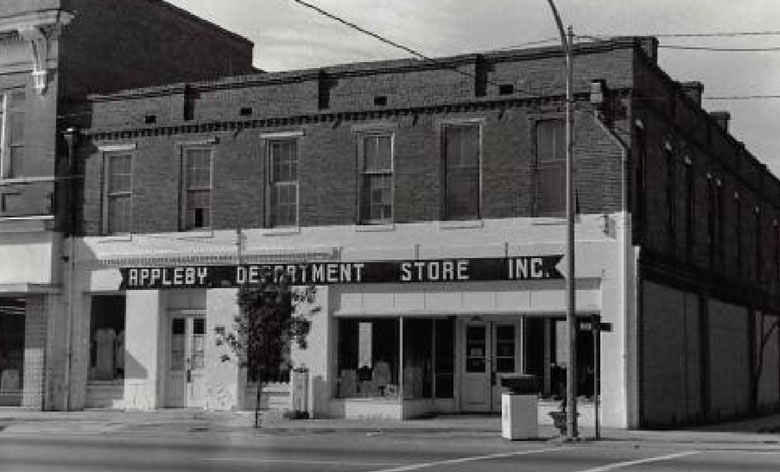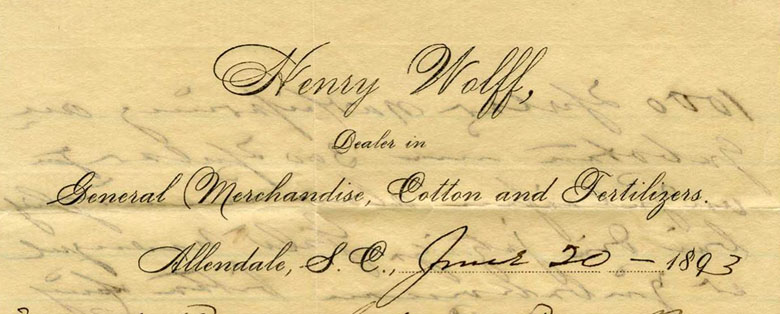
Henry Wolff & Co.
Merchant
1885-1936
Allendale, SC
FAMILIES: Wolff; Pearlstine
Henry Wolff (1848-1914) was born in Rogowo, Prussia (present-day Rogowo, Poland) in 1848. At eighteen years of age, in the summer of 1866, he boarded the ship Saxonia in Hamburg, Germany, and left Europe for the United States. On August 5 of that year, Henry arrived in New York, where he would remain through at least 1870. According to various family letters and census records, while in New York, he worked as a butcher with his cousin/business partner, Moritz Sellig, of Darmstadt, Germany. By 1871, Henry was living in Augusta, Georgia. There, he operated a clothing and dry goods store at 156 Broad Street. In 1874, he married twenty-three-year-old Emily Myers (1852-1875). Emily died the following August, possibly in childbirth.
Sometime after his wife’s death, Henry moved to Allendale, SC, some fifty miles away, where he opened a general merchandise business with Jewish merchant Joseph A. Simon, whom he met in Augusta. In 1885, Henry bought out Joseph’s share of the business and continued operating it under his own name. By 1886, Henry was selling a variety of goods from his store, including groceries, clothing, millinery, furniture, and even coffins.
Henry’s financial success and social standing was such that by 1890 he and twelve other prominent citizens were together able to invest $50,000 (some $1.6 million in 2023 dollars) to charter the Bank of Allendale, the town’s first financial institution. Dependent on the yields of local cotton farmers, Henry’s financial situation fluctuated with the highs and lows of the late-nineteenth-century cotton market. Nevertheless, he occasionally sent money to his parents in the Old Country, paying for his father’s medical treatment and his sister Pauline’s dowry.
Around 1899, Henry wrote in a letter to his brother Samuel, who lived in Brooklyn, New York, that he had hit “rock bottom.” He lamented the death of his parents, his “miserable, deplorable and lonely existence” in Allendale, and his absence from thirty years’ worth of family interactions. Two years later, however, his “lonely existence” ended when he married Rachel “Ray” Pearlstine (1871-1936) of Branchville, South Carolina. Twenty-three years his junior, Ray was the daughter of general merchandise and clothing merchants Rebecca Tobish (1844-1917) and Louis Charles Pearlstine (1836-1886). The year of their marriage, Henry built what is thought to be the first brick store on Main Street in Allendale—a two-story building at the corner of West Bay Street, across from the Bank of Allendale. The ground floor housed the family store, and the upstairs served as a residence for Henry and Ray when they were first married. Henry later built a large two-story house for himself, Ray, and their three children on East Bay Street. Rachel’s brother, Thomas Pearlstine (1879-1961), and his wife, Fanny Strauss Pearlstine (1879-1968) moved in over the store when Henry, Rachel, and Tom started the Allendale Buggy and Wagon Company in 1912. In later years, the upstairs was rented to a telephone company and used as a phone exchange.
In 1910, Henry built a second, more substantial two-story building next to his original building, and this remained the site of Henry Wolff and Co. until his death from pneumonia in 1914. Ray continued to operate the business until her death in 1936; she also rented out rooms in her home and served kosher meals to Jewish businessmen visiting, mainly as cotton or watermelon buyers. After Ray’s death, her daughter, Sura (1908-2016), and son-in-law, Sam Wengrow (1904-1970), opened Wengrow’s Department Store in the original Wolff building on the corner of Main and West Bay Streets.
Main Image: The original (center) and second (left) Wolff buildings in Allendale, 1979. Image from South Carolina Department of Archives and History.

Above Image: Letterhead from Henry Wolff’s store. Courtesy of Special Collections, College of Charleston Libraries.